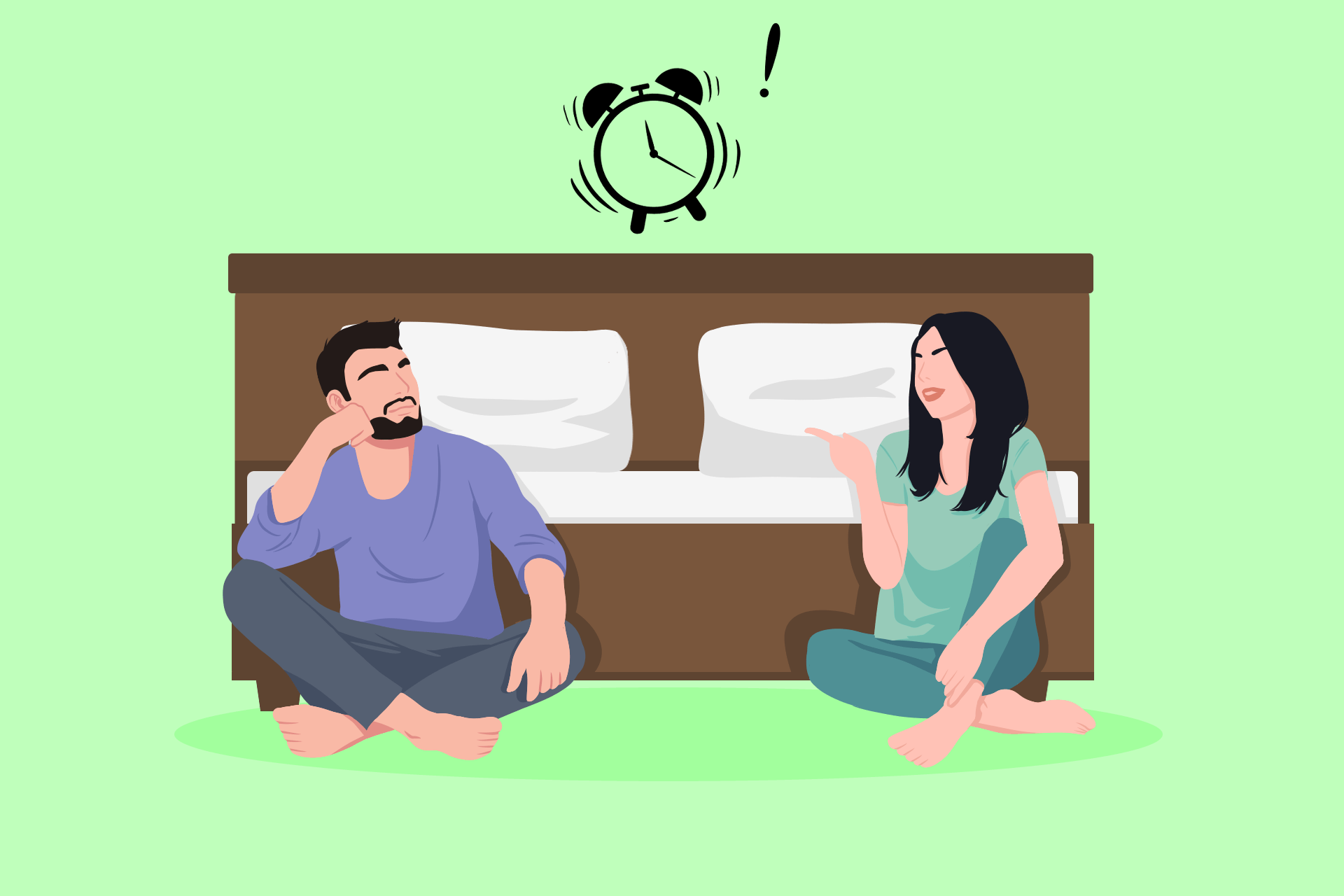Edging, often described as teasing or surfing, is a technique used to enhance pleasure and build sexual endurance. For men struggling with premature ejaculation (PE), edging has become a popular method for gaining more control over their orgasms. Beyond that, the slang term edging also highlights potential physical benefits, such as increasing sperm volume. However, as with any technique, it has its pros and cons.

This guide explores in detail what edging is, including how it may work to improve sexual control and endurance, along with instructions on how to practice it safely. It also discusses potential benefits and harmful side effects, addressing concerns about whether edging can cure PE or cause harm over time.
Table of Contents
What Is Edging?
So, what is edging? The basic definition of edging is the practice of stimulating the penis just before the point of orgasm and then stopping to prolong sexual activity [1]. This cycle can be repeated several times before finally reaching a climax. It is sometimes compared to surfing because it involves balancing on the fine line between pleasure and release. The meaning behind edging is to delay and enhance pleasure.
Though commonly associated with male sex pleasure, edging can be practiced by both males and females, making it a versatile method. Some people incorporate sex toys or specific techniques to increase the intensity of the experience. It can be practiced solo or with a partner, making it accessible to anyone, regardless of gender identity or sexual orientation.
How to Do It: Proper Techniques
The goal of edging is simple: bring yourself to the edge of orgasm and then back off before climaxing. But achieving this requires patience and a good understanding of your body’s signals. Below are the primary methods and tips to practice edging properly.
During Sex with a Partner
Edging during sex involves communication and coordination with your partner. One way to do this is through changes in rhythm or intensity. Slow down when approaching climax or switch to a less stimulating position. Using sex toys can also help by varying the sensations. It’s important to know when to pause and when to continue, which comes with practice. This technique ultimately helps you last longer in bed and enhance intimacy and connection with your partner.

During Masturbation
When practicing alone, edging requires self-awareness and a focus on maintaining control. The key is to bring yourself close to orgasm and then stop or slow down stimulation before reaching climax. This is often done multiple times during a masturbation session. Techniques such as squeezing the base of the penis or using a less sensitive grip can help prolong the experience.
Does Edging Help You Last Longer?
Edging makes you last longer in bed through a process of controlling your arousal levels. As you approach climax, stopping or slowing down stimulation allows your body to reset and reduce the immediate urge to orgasm. This control helps build awareness of the sensations leading up to climax, giving you the ability to regulate them more effectively.
The key to lasting longer is repeatedly approaching the “point of no return” without crossing it. This practice trains your body to delay the final release, extending sexual activity. Over time, you gain greater endurance, making it easier to manage your body’s response and avoid premature ejaculation. The more you practice edging, the more refined your control becomes, resulting in longer, more satisfying sessions in bed.
Edging Benefits
Edging offers more than just delayed gratification. It’s a practice that can reshape how individuals and couples experience pleasure, focusing on exploration, control, and intimacy rather than rushing to orgasm. Many have found that edging techniques help them last longer in bed and open the door to deeper emotional and physical connections. Below are some key benefits of edging.
Enhanced Orgasm Intensity
Edging can heighten the intensity of orgasms, making them more satisfying. Building up excitement through delayed stimulation can make the climax feel stronger, whether during masturbation or with a partner [2]. This practice allows both partners to experience heightened pleasure since the delayed release leads to a more profound sense of satisfaction. The gradual arousal process offers a deeper physical and emotional connection, improving the overall sexual experience.
Improved Sexual Stamina
For men dealing with premature ejaculation, edging serves as a powerful method to develop better control and endurance. This technique closely resembles the stop-start method, where stimulation is paused just before climax to reduce the urge to ejaculate. Research implies that the stop-start and squeeze approaches are often effective at augmenting sexual stamina in the short term [3].
With regular practice, edging can help men last longer in bed, increasing both stamina and confidence. In addition to prolonging the duration of sex, it shifts the focus away from immediate release, encouraging partners to enjoy the moment and explore each other’s bodies more fully.
Increased Sexual Awareness and Exploration
Edging allows individuals to explore what triggers their sexual responses, offering valuable insights into personal pleasure. This awareness can boost confidence, reduce performance anxiety, and improve communication between partners. For couples, the practice of delaying climax fosters experimentation with new activities and positions, helping them discover mutual desires. A study shows that many women reach orgasm more reliably through clitoral stimulation rather than penetration [4]. Practicing edging provides time to explore these varied forms of stimulation, improving sexual satisfaction for men and women.
Better Control Over Arousal
A key advantage of edging is the ability to gain more control over arousal. Men become familiar with their bodies and learn to manage the sensations leading to orgasm. This control helps last longer and adds an element of excitement by letting individuals decide when to climax. The extended duration creates opportunities for deeper emotional bonding, as partners become more attuned to each other’s needs.
Holistic Sexual Satisfaction
Edging encourages couples to engage in more than just penetrative sex, which enhances the overall sexual experience. Exploring different methods of pleasure, such as incorporating toys or clitoral stimulation, can create a more fulfilling encounter. Removing the pressure of immediate climax shifts the attention to mutual enjoyment, helping partners focus on intimacy and connection. For individuals who find traditional intercourse insufficient, edging provides a way to explore sexual satisfaction beyond penetration.
Can Edging Help Cure Premature Ejaculation (PE)?
No, edging cannot cure premature ejaculation. However, it can be an effective tool to help manage and control it. Men who practice edging regularly can train themselves to recognize the physical signals of approaching orgasm and delay ejaculation. This can lead to improved stamina and longer-lasting sexual experiences.
However, edging alone is not a guaranteed solution for every man. In many cases, additional treatment options, such as therapy or medical intervention, may be necessary to fully address PE. Each individual’s response to the technique can vary, and it should be seen as part of a broader strategy rather than a standalone cure.

Does It Increase Testosterone?
There is no strong scientific evidence proving that edging can significantly increase testosterone levels. Testosterone is a key hormone in male sexual function, and heightened arousal might cause a brief boost. However, this effect, if it exists, is not well-documented or proven safe in clinical studies. While edging might have other sexual benefits, expecting it to raise testosterone levels meaningfully is speculative at best. Further research is needed to confirm any clear link.
Side Effects & Dangers
Although edging has the benefits discussed above, it can cause dangerous effects that are important to consider. One significant negative effect is the potential for frustration or anxiety. The practice of delaying orgasm may create emotional tension, particularly if expectations of heightened pleasure are not met. This buildup can lead to a cycle of disappointment, causing frustration during sexual activity. Additionally, those struggling with performance anxiety may find that the pressure to maintain prolonged arousal without climax exacerbates their concerns, diminishing overall satisfaction.
Edging can also lead to overstimulation and discomfort when done excessively. Bringing oneself close to orgasm repeatedly without release may cause soreness or even pain, particularly in the penis. This occurs because blood remains trapped in the genitals for too long, leading to irritation or temporary loss of sensation. If done too frequently, it can result in bruising or increased sensitivity.
Finally, there’s a risk of developing a psychological dependence on edging, where a person may struggle to reach orgasm without using the technique. This dependence could affect both solo and partnered sexual experiences, making it difficult to enjoy sex or masturbation without the delay provided by edging. Over time, this reliance might harm sexual relationships by creating frustration or dissatisfaction.
Additionally, there’s also a possibility that edging might raise cortisol levels, the body’s stress hormone. While some claim that it can boost testosterone, excessive stress from prolonged sessions may elevate cortisol, leading to fatigue, mood swings, and lower testosterone. Moderation is key to avoiding these potential side effects and maintaining your overall sexual health.
Does Edging Cause Prostate Cancer?
There is currently no direct evidence to suggest that edging causes prostate cancer. Indeed, regular ejaculation, whether via sexual activity or masturbation, may be linked to a reduced risk of prostate cancer [5]. However, the relationship between sexual practices like edging and prostate health is complex and not fully understood.
It’s essential to consider that while edging itself is not proven to cause prostate cancer, excessive or aggressive sexual practices may lead to pelvic discomfort or issues related to prostate health. If there are concerns about prostate health or cancer risk, it’s best to consult a physician for personalized advice and information.
Does It Cause Erectile Dysfunction?
Edging does not cause ED. It primarily involves controlled sexual stimulation without reaching orgasm, which can enhance blood flow to the penis. This increased blood flow helps maintain healthy erectile function. ED is typically linked to various factors, including medical conditions like diabetes and heart disease, certain medications, and psychological issues such as anxiety and depression [6].
When performed correctly, edging can enhance sexual experiences and improve erectile health rather than cause dysfunction. If someone experiences persistent issues with ED, consulting a physician for personalized advice and strategies may be beneficial.

Practicing Edging: Is It Worth It?
The answer largely depends on individual preferences and experiences. For many, edging can enhance sexual pleasure, lead to more intense orgasms, and improve control over sexual response. These benefits can contribute to a fulfilling sexual experience for both solo and partnered activities.
However, it’s essential to consider the potential drawbacks associated with edging. While some people enjoy the practice, excessive edging may lead to increased sensitivity or psychological dependence. Additionally, some individuals may experience physical discomfort or frustration if they become accustomed to the delayed gratification that edging provides.
Ultimately, if practiced in moderation and with awareness of its effects, edging can be a rewarding sexual technique. However, you should remain mindful of your body and feelings, ensuring that the practice enhances rather than detracts from your overall sexual health and satisfaction.
Conclusion
Conclusively, edging can be a valuable technique for enhancing sexual pleasure and managing premature ejaculation, offering benefits like increased stamina, heightened sexual awareness, and more intense orgasms. It allows for better control over arousal, contributing to more satisfying sexual experiences with a female partner. However, moderation is key. Whether edging is right for you depends on your preferences. Practicing it mindfully, with open communication, can help you enjoy the benefits while reducing risks, ensuring a fulfilling and satisfying sexual experience.
References:
- What Is Edging in Sex? By WebMD Editorial Contributor. Medically reviewed by Carmelita Swiner. Retrieved: October 14, 2024. Webmd.com.
- What Is “Edging” and Why Might It Be Employed? Retrieved: October 14, 2024. Issm.info.
- Medical Therapy for Premature Ejaculation. By Amar Mohee. Published: October 2011. Ncbi.nlm.nih.gov.
- Women’s Experiences with Genital Touching, Sexual Pleasure, and Orgasm: Results from a U.S. Probability Sample of Women Ages 18 to 94. By Debby Herbenick, Tsung-Chieh (Jane) Fu, et al. Published: August 9, 2017. Tandfonline.com.
- Does Frequent Ejaculation Reduce Your Risk for Prostate Cancer? By Susan York Morris. Medically reviewed by Seunggu Han. Retrieved: October 14, 2024. Healthline.com.
- Is Edging Healthy? By Aaron Kandola. Medically reviewed by Stacy A. Henigsman. Retrieved: October 14, 2024. Medicalnewstoday.com.